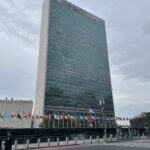If there has been one international organization that has attracted so much attention in the recent past and one that has seen so much heat heaped on it from so many different sources, it is undoubtedly the United Nations.
It has become an annual pilgrimage for many world leaders to come to New York to vent their frustrations and anger but rarely any expression of joy or gratitude to the world body that was created in the aftermath of the Second World War that left behind so much death and destruction. Some 50 nations came together in 1945 to lay the foundation of an organization that was seen as providing hope for peace and a part of the emerging world order.
It is difficult to put down exactly how many conflicts are raging in the international system or even ponder if there is any part of the world that has been spared violence within nations or between them. There are those who immediately spring to their feet to blame the world body for inaction or being ineffective but perhaps belong to the same group that invokes national sovereignty to prevent “outside” interference in internal affairs. Peacekeeping Operations (PKOs) of the United Nations have been pared down to the absolute minimum not only because of funding issues. It is also a problem of some nations not wanting “Blue Helmets” on their soil.
But the general consensus, as seen by opinion surveys, is a perception in much of the 193 nations—or 203 if territories and islands are included—that the United Nations has generally been beneficial for humanity, be it in terms of dealing with hunger, disease, or poverty.
For all the noise generated that tin-pot dictatorships and tyrants have taken over functional agencies like those dealing with human rights, there is appreciation for what agencies like the World Bank are doing in coming to terms with the developmental imperatives of the poor souls struggling to keep their heads above water. It is a huge battle that the Bank wages with itself every year, making sure pledges and commitments of the rich and industrialized translate into dollars and cents. And this is not to forget the argument on the outside that the Agency should not be having China and India in their portfolios.
Looking back, it would now seem insane as to how anyone could just about write off the functioning and effectiveness of a body to a group of five nations, known as the Permanent Five or P5, with their most prized possession, the VETO. In one stroke, the world body had been reduced to a near-irrelevant entity just because one member holds the others to ransom because it has the power of blocking movement on an issue deemed to be in its “national” interest.
Slamming the West most of the time ignores the deliberate failures of Russia and China. And the question arises of who should be involved in the blame game over the near non-movement on the question of reforms, including that of the Security Council, long seen as an anachronism.
In ways more than one, the responsibility of ensuring the legitimacy of the United Nations has been undermined by those very nations entrusted with the task. And the examples do not start and end with the Ukraine conflict or the goings-on in Gaza. The blatant invasion of Ukraine by Russia under the guise of a “Special Military Operation” and the support extended by China is as shocking as the disgusting silence on the goings-on in Gaza.
France, which is now throwing its weight behind a Palestinian State, has a significant economic connection with Israel with a total trade of around US$4 billion; and some capitals of Europe that are loud at times over Gaza will have to note that the European Union is Tel Aviv’s biggest trading partner, accounting for more than 30 percent. The supreme irony is that nations talking of a two-state solution will have to ask a different question now given what has been going on in the West Bank and Gaza: are we talking of contiguous states?
By the end of September, the noise and din of the General Assembly special session will largely be over, with leaders and their entourages packing their bags for back home or a stop in Washington, D.C., hopeful of a meeting at the White House. Every one of the Heads of State, Government, or their designated representatives will be convinced of having put forth their country’s point of view forcefully.
But the real question is if the needle has moved in terms of perceptions of increased legitimacy of the United Nations. And that will come about only if nations look beyond selfish interests and at global good.
It takes only one thing to rein in the United Nations from the drift that ironically was set in motion by nations within the organization itself: political will and a determination to see issues in a global perspective. Looking at climate change, health, or migration, to mention just three, in narrow perspectives and hence denying funding or pulling out of crucial functional agencies is not helping the United Nations fulfill its mandate in a holistic fashion.
There is no point screaming when a country like China moves in seeing an opening with a view to setting an agenda of its liking. For that matter, it may be too late for major donors to get back into the scheme of things at a future date.
Disclaimer: The opinions and views expressed in this article/column are those of the author(s) and do not necessarily reflect the views or positions of South Asian Herald.






